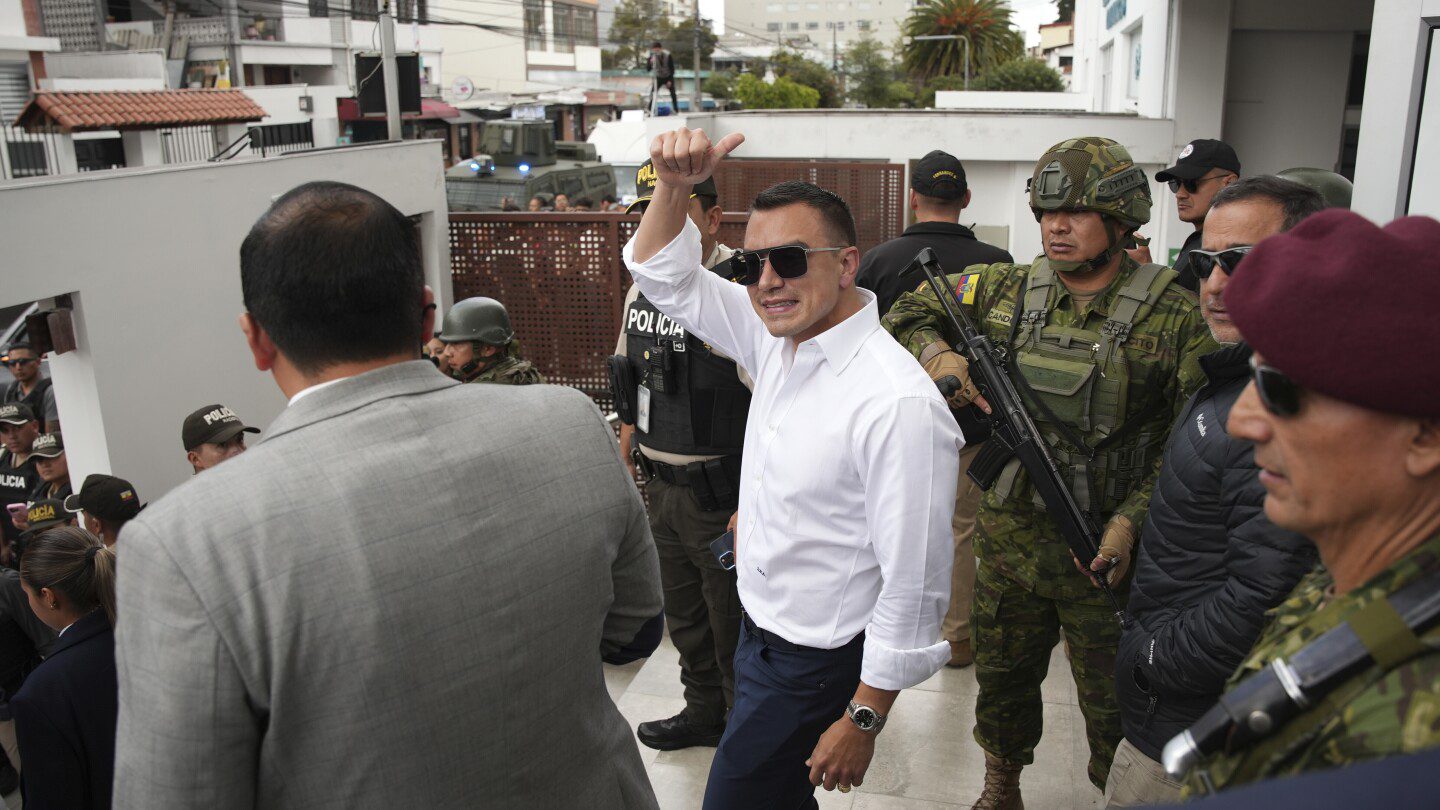
GUAYAQUIL, Ecuador (AP) — The upcoming runoff election for the presidency of Ecuador in April will serve as a significant indicator of former leftist President Rafael Correa’s enduring impact. His protégé, attorney Luisa González, will face off against conservative incumbent Daniel Noboa.
In the initial round held on Sunday, neither Noboa nor González secured an outright majority, but results released Monday showed both candidates significantly ahead of the other 14 competitors and within just a percentage point of each other.
This runoff is a continuation of the 2023 snap election triggered by the dissolution of the National Assembly, during which Noboa secured a shortened 16-month presidency after advocating for measures to combat Ecuador’s escalating crime crisis.
González continues to appeal to voters’ nostalgia for Correa’s administration from 2007 to 2017, a period before the surge in drug-related violence and characterized by his expansive spending policies.
Many voters on Sunday based their decisions on whether they wished to see the return of what is referred to as Correismo.
Supporters of this movement yearn for the low crime and unemployment rates experienced during Correa’s tenure, while often overlooking his authoritarian inclinations, the substantial national debt accumulated, and the corruption-related conviction he received in absentia in 2020.
Even among Noboa’s supporters, many indicate their vote was more a rejection of Correismo than a strong endorsement of the incumbent’s initiatives against crime and governance.
Last year, many Ecuadorians expressed frustration when Noboa authorized power outages lasting up to 14 hours due to a severe drought and have remained skeptical of his use of military force in combating drug trafficking.
The narrow gap between the two candidates signifies “Noboa’s failure to connect with other societal segments hesitant about the revival of Correismo,” noted Grace Jaramillo, an expert on the Andean region and a professor at the University of British Columbia.
Furthermore, it reflects “concerns regarding his inadequate management of the energy crisis last fall” and what critics view as an excessive use of power in the fight against drug cartels, she added.
According to the Ecuadorian National Electoral Council, with 92.1% of votes counted, Noboa received approximately 4.22 million votes (44.31%), while González garnered around 4.17 million votes (43.83%). The remaining 14 candidates trailed significantly behind.
The Road Ahead
The candidates will now focus on their campaigns for the April 13 runoff election, which will grant the winner a full four-year term.
In Ecuador, voting is mandatory. More than 83% of the approximately 13.7 million eligible voters participated in Sunday’s election.
This marks the fourth consecutive occasion where a candidate from Correa’s movement has failed to achieve outright victory in the first round. Noboa, aged 37, and González, aged 47, emerged as the primary contenders before the election.
González has held various governmental roles during Correa’s presidency. Like Noboa, she served as a lawmaker from 2021 until May 2023, when then-President Guillermo Lasso dissolved the National Assembly, thus shortening his own term.
Now, both candidates must seek additional support from pro- and anti-Correa voters, as well as from smaller political factions, including indigenous leader Leonidas Iza, who appeared on the ballot and placed a distant third.
Will Freeman, a fellow specializing in Latin American relations at the Council on Foreign Relations, commented that Noboa “may need to emphasize an anti-Correismo stance. However, this presents a dilemma since a significant part of his initial appeal stemmed from his youthful image and ability to connect with voters weary of political polarization.”
Freeman noted that the April election will assess whether Correismo can engage more voters in runoff scenarios compared to previous first-round elections where it struggled to do so.
“They have a loyal core group but face challenges in winning over moderates and individuals indifferent to both Correismo and its opposition,” he stated.
Addressing Crime, Governance, and Campaign Strategies
The spike in violence gripping Ecuador over the last four years is linked to the rampant cocaine trafficking originating from neighboring Colombia and Peru, and it remains a top concern for voters.
Under Noboa’s administration, the homicide rate decreased from 46.18 per 100,000 individuals in 2023 to 38.76 per 100,000 last year. However, this figure is still alarmingly higher than the 6.85 per 100,000 recorded in 2019, and other crimes, including kidnapping and extortion, have surged, leaving citizens anxious about venturing out.
Moreover, some of Noboa’s aggressive strategies over the past 15 months have faced scrutiny for testing the boundaries of acceptable governance and legal norms.
In January 2024, he effectively declared a state of war against drug gangs, leading to military deployments that critics argue have overreached. He has also faced backlash for authorizing a police raid on Mexico’s embassy to apprehend former Vice President Jorge Glas, a convicted fugitive who had been residing there for months.
The power outages experienced last year lasted for several weeks, resulting in estimated losses of $7.5 billion for businesses, according to trade associations. Noboa’s administration attributed these outages to a severe drought, yet has failed to provide data to support this claim.
“While he was adept at promoting himself politically through social media, he struggled to engage directly and effectively with Ecuadorians outside of that environment,” Jaramillo remarked.
“Mr. Noboa must reassure the electorate that he embodies the ideals of democratic leadership in the second round and is prepared to uphold the rule of law through his actions,” she concluded.









